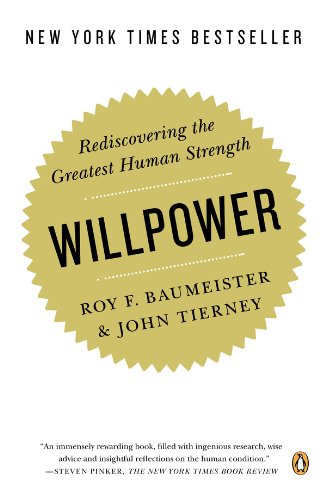***
Title: Willpower
Author: Roy F. Baumeister & John Tierney
Genre: Self-help
Year: 2011
Rating: 4 of 5 stars
***
I was intrigued by the premise of this book. Willpower. I’ve told myself for years that I have very weak willpower. Its limited presence shows itself in the way I struggle to lose weight, save money, and mark off items on my to-do list. So I wanted to know about willpower. What it is, what it does for me, and how to strengthen mine.
A good chunk of this book was devoted to case studies and celebrity examples of what willpower looks like (and what it doesn’t). I wasn’t very impressed with it all, wondering how to apply the hundreds of case studies presented to my own life. Now, I love to read case studies. I find the human psyche incredibly complex and interesting. But it got a little too much for me, especially when life application was lacking.
The last part of the book (starting with Chapter 9) was when things started getting interesting for me. This was when I started seeing more life application. This is when I began to understand it all.
In the spirit of a self-help book, I’m taking a different approach to this book review. Instead, here is what I learned from this book:
1. We all possess a finite amount of willpower that gets depleted throughout the day. (p. 35)
2. For every task completed throughout the day, from forcing ourselves out of bed in the morning to not eating that second piece of chocolate after lunch, draws from the same stock of willpower. (p. 35)
3. “Whether you’re judging yourself or judging others, never equate being overweight with having weak willpower.” (p. 215)
4. The Oprah Paradox. Think about Oprah. She is hugely successful and she couldn’t have gotten to where she is without having exceedingly high self-control and willpower. Yet she struggles with losing weight (and keeping it off). Even people with high self-control can struggle with their weight. (p. 217)
5. It’s more important to heed the body’s internal cues than the external cues. When we diet, we start imposing more external rules on our bodies: when to eat, how much, etc. But it’s more important to listen to our bodies. Learn to recognize our hunger signals, and learn to recognize when we are full. (p. 223) This is something that Weight Watchers, in particular, heavily emphasize. There was a pretty interesting study done on this very issue and it hit home the point of internal versus external cues.
6. When we start craving sweets, it’s more than just a matter of weak willpower. Our cravings have a “sound physiological basis”. Self-control depletes glucose and the fastest way to get that back? Eating sweets. It’s at this point that we need to reach for something richer in protein and nutrients, even though reaching for chocolate is the more satisfying option. (p. 226 – 227)
7. “…people with high self-control consistently report less stress in their lives. They use their self-control not to get through crises but to avoid them. They give themselves enough time to finish a project; they take their car into the shop before it breaks down; they stay away from all-you-can-eat buffets. They play offense instead of defense.” (p. 239)
8. In the game of willpower, it’s the exertion of trying to make a decision that matters. Even if you end up giving in, it doesn’t automatically replenish your willpower stock, although it will help you from expending more willpower with this decision. (p. 244)
I found the book to be quite an interesting read, although it was really the last three chapters that spoke to me the most. The book is heavy on case studies and makes up about 90% of the book’s content. I enjoy reading studies so it wasn’t a big deal for me, but it did get a little too much at times. If you enjoy self-help, it’s a good read. And if the psyche into self-control and willpower interests you, I would definitely recommend this book.
I received this book for free from TLC Book Tours in exchange for an honest review. All words and opinions are my own.

Leave a Reply